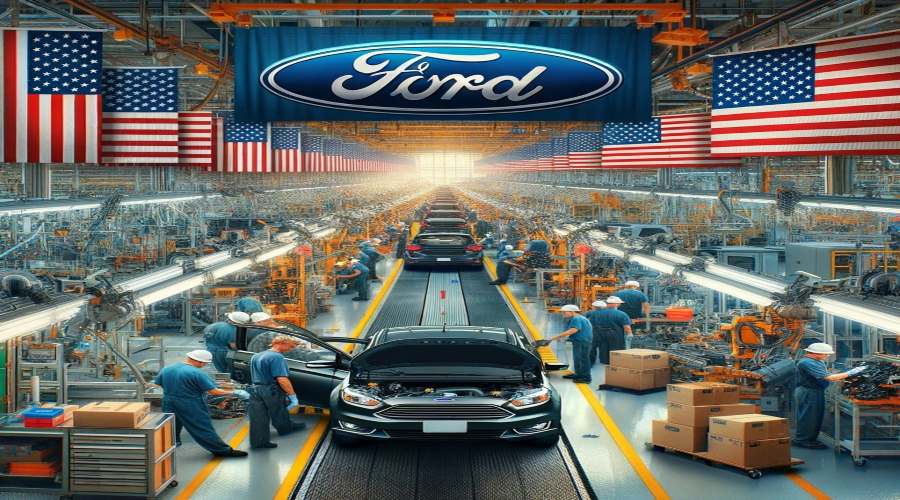Is Ford Made in America? This question is often asked by car enthusiasts and potential buyers curious about their vehicles’ origins. Ford, an iconic American brand, has a rich history that dates back to its founding by Henry Ford in 1903. Ford has long been associated with American manufacturing and is known for revolutionizing the automotive industry by introducing assembly line production. In this blog, we’ll delve into Ford’s production practices, explore where their vehicles are manufactured, and discuss what “Made in America” truly means in today’s global economy.
Is Ford Made in America?
Yes, Ford vehicles are made in America, but the company also has manufacturing plants in various countries around the world. Ford’s commitment to American manufacturing is evident through its numerous factories and assembly plants across the United States, which produce a significant portion of its vehicles.
Is Ford Made in America?
Ford, founded in 1903, is firmly committed to American manufacturing, with key plants in Michigan, Kentucky, and Chicago. Ford’s moving assembly line revolutionized the automotive industry, producing vehicles like the iconic F-150 and electric models and supporting local economies.
Despite globalization, Ford maintains a robust American presence through investment in US manufacturing facilities. Ford focuses on high-quality standards and job creation thanks to advanced technology and a skilled workforce.
Ford’s American-made vehicles are known for durability and performance, backed by a strong U.S. presence and local production, giving it a competitive edge in the automotive market.
Ford is implementing sustainable production practices, investing in renewable energy and waste reduction at its US plants. The Rouge Complex in Michigan uses solar panels and rainwater recycling systems.
Ford’s American manufacturing legacy showcases its dedication to quality, innovation, and community support. A significant portion of its vehicles are still produced in the U.S.
What is Ford’s Global Manufacturing Footprint?
Overview of Ford’s Global Operations
Ford operates manufacturing plants in several countries, including Canada, Mexico, China, and Germany. This global presence allows the company to cater to diverse markets and optimize production costs.
Benefits of Global Manufacturing
Global manufacturing enables Ford to leverage cost efficiencies, access skilled labor, and benefit from regional trade agreements. This strategy helps the company remain competitive in the global automotive market.
Impact on Quality and Innovation
Despite its global footprint, Ford maintains stringent quality control standards across all its plants. Innovations developed in one region often benefit the entire company, ensuring that all Ford vehicles meet high-quality benchmarks.
Challenges and Considerations
Operating globally presents challenges such as logistics, compliance with local regulations, and cultural differences. Ford addresses these issues through robust management practices and strategic partnerships.
Future of Ford’s Global Manufacturing
Looking ahead, Ford aims to balance its global production with an increased focus on local manufacturing, particularly in key markets like the U.S. and China. This approach will help Ford meet regional demands more effectively.
What Does “Made in America” Mean?
The term “Made in America” can have different interpretations depending on the context. Here are some key points to consider:
- Domestic Assembly: Vehicles assembled in the U.S. with both domestic and imported parts.
- Domestic Parts Content: The percentage of parts sourced from American suppliers.
- Economic Impact: Contributions to the American economy through jobs and local investments.
- Regulatory Standards: Compliance with U.S. manufacturing and safety standards.
How Does Ford Implement Sustainable Manufacturing Practices?
Commitment to Sustainability
Ford is dedicated to incorporating sustainability into its manufacturing processes. The company strives to reduce its environmental impact through various innovative practices.
Renewable Energy Sources
One of the key initiatives includes the use of renewable energy. Ford has integrated solar panels and other renewable energy sources into its manufacturing plants to reduce reliance on fossil fuels and lower greenhouse gas emissions.
Waste Reduction Programs
Ford has established robust waste reduction programs across its facilities. These programs aim to minimize waste generation and promote recycling and reuse of materials wherever possible.
Water Conservation Efforts
Water conservation is another critical area of focus for Ford. The company has implemented water recycling systems and efficient water usage practices to conserve this vital resource. For example, the Rouge Complex in Dearborn, Michigan, employs rainwater recycling systems to reduce water consumption.
Eco-friendly Materials
In its commitment to sustainability, Ford also emphasizes the development and use of eco-friendly materials. This includes incorporating recycled plastics and sustainable fabrics in vehicle production, reducing the environmental footprint of their products.
Environmentally Responsible Manufacturing
Ford’s dedication to sustainable manufacturing is evident in its continuous efforts to adopt and innovate environmentally responsible practices. These initiatives reflect Ford’s broader commitment to being a leader in sustainability within the automotive industry.
Where Are Key Locations of Ford’s American Plants?
Dearborn, Michigan
The Dearborn Truck Plant is famous for producing the Ford F-150. This plant is a cornerstone of Ford’s American manufacturing legacy.
Louisville, Kentucky
The Kentucky Truck Plant manufactures the Ford Super Duty trucks and other large vehicles. It is a vital part of Ford’s production network.
Chicago, Illinois
The Chicago Assembly Plant produces the Ford Explorer and Lincoln Aviator. This plant plays a crucial role in meeting the demand for SUVs.
Kansas City, Missouri
The Kansas City Assembly Plant is another significant facility, producing the Ford Transit and F-150. It showcases Ford’s commitment to versatile manufacturing.
How Does Ford Support American Jobs?
- Job Creation: Ford’s investment in U.S. plants creates thousands of jobs for American workers.
- Economic Contributions: Ford’s manufacturing activities contribute significantly to the U.S. economy through taxes, wages, and local spending.
- Community Support: Ford supports local communities through various initiatives, including educational programs and charitable donations.
- Advanced Manufacturing Training: Ford invests in training programs to equip workers with skills for modern manufacturing technologies.
- Partnerships with Suppliers: Ford collaborates with numerous American suppliers, further boosting the domestic economy.
- Innovation Hubs: Ford’s U.S. plants often serve as innovation hubs, developing new technologies and production methods.
Conclusion
Yes, Ford vehicles are made in America, with a significant portion of their production occurring in U.S. plants. Ford’s commitment to American manufacturing is evident through its extensive network of factories and assembly plants across the country. While the company also has a global manufacturing footprint, its dedication to producing vehicles in the U.S. remains strong. This commitment not only supports the American economy but also ensures high-quality production standards. Whether you’re driving a Ford F-150 or exploring their latest electric models, you can trust that Ford continues to honor its American roots while embracing a global perspective.
FAQs
Is Ford an American company?
Yes, Ford is an American company, founded by Henry Ford in 1903.
Where are Ford vehicles manufactured?
Ford vehicles are manufactured in various locations, including the United States, Canada, Mexico, China, and Germany.
Does Ford produce all its vehicles in the U.S.?
No, while many Ford vehicles are made in the U.S., the company also has manufacturing plants in other countries to serve global markets.
What are some key Ford manufacturing plants in the U.S.?
Some key Ford manufacturing plants in the U.S. include the Dearborn Truck Plant in Michigan, the Kentucky Truck Plant, and the Chicago Assembly Plant.
Does Ford use sustainable manufacturing practices?
Yes, Ford is committed to sustainability and has implemented various eco-friendly practices in its manufacturing processes.










